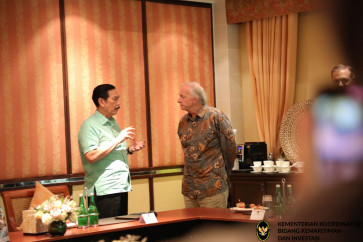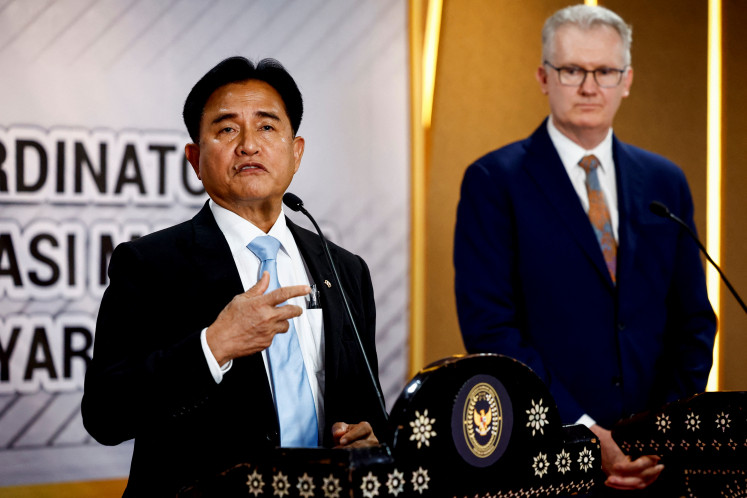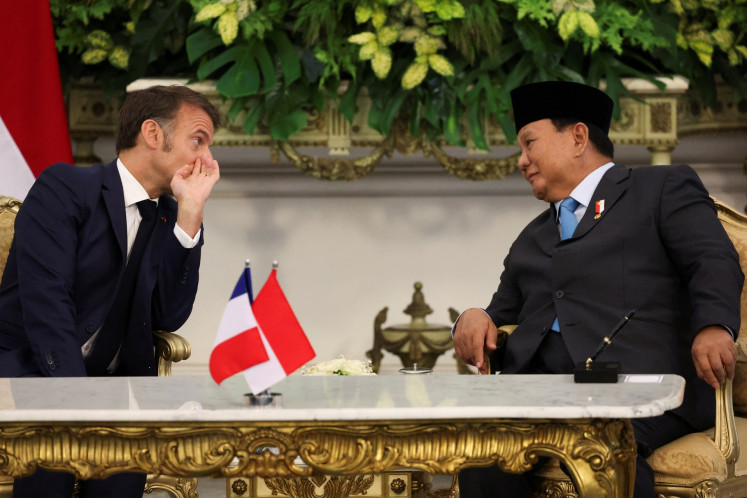'Soekarno': Exploring RI founding father's personal struggle
Sukarno (Ario Bayu) sits with one of his students, Fatmawati (Tika Bravani), during his exile in Bengkulu
Change text size
Gift Premium Articles
to Anyone

Sukarno (Ario Bayu) sits with one of his students, Fatmawati (Tika Bravani), during his exile in Bengkulu.
With his new film, award-winning director Hanung Bramantyo takes a look at the personal struggle experienced by Sukarno, one of Indonesia's founding fathers, during what was a pivotal episode in his life and that of his new nation.
Soekarno is Hanung's latest installment in a series of films looking at important historical figures, following Habibie & Ainun in 2012 and Sang Pencerah (The Enlightener) in 2010. The former was about Indonesia's third president, BJ Habibie, while the latter looked at Ahmad Dahlan, the founder of Indonesia's second-largest Muslim organization, Muhammadiyah.
Based on the life of Indonesia's first president, Soekarno depicts different stages of his life but places more focus on the period 1929 to 1945, the year he and Mohammad Hatta proclaimed Indonesian independence.
As a teenager, Sukarno, who was born Kusno Sosrodihardjo, is sent to Surabaya in 1916 to attend a Hogere Burgerschool (Dutch preparatory school) where he lives in a boarding house owned by Tjokroaminoto, a nationalist and founder of Sarekat Islam.
He learns about political ideologies from Tjokroaminoto and his fellow boarders, including Muso, the future leader of the then Indonesian Communist Party (PKI), who led a failed rebellion in 1948. The teenaged Sukarno also meets and falls in love with Dutch girl Mien; he intends to propose to her but he is rejected by her parents.
In 1927, Sukarno along with his friends establishes the pro-independence Indonesian National Party (PNI). The party advocates independence for Indonesia and opposes imperialism and capitalism, arguing that both systems worsen the lives of Indonesian people.
In 1930, after being imprisoned by the Dutch East Indies government for his political activities, Sukarno and his wife, Inggit Garnasih, are sent into exile, first to the remote town of Ende on the island of Flores and then to Bengkulu on western coast of Sumatra.
In Bengkulu, he teaches at a local school owned by the Muhammadiyah. He then becomes romantically involved with one of his students, 15-year-old Fatmawati, which causes a rift in his relationship with Inggit and, ultimately, within himself.

In 1942, Imperial Japanese troops invade the Dutch East Indies and quickly defeat the Dutch. Sukarno is freed from his exile and is transported to Jakarta by the Japanese government.
There, he is reunited with other nationalist leaders, including Mohammad Hatta and the idealistic Sutan Sjahrir.
Sukarno is willing to cooperate with the Japanese to obtain a platform to spread his nationalist ideas to the masses. The Japanese, in return, need Indonesian manpower and the country's natural resources to aid its war effort.
Sjahrir rejects Sukarno's deal with the Japanese, but Hatta supports him. His cooperation with the Japanese is not an easy decision for him, having seen the brutality of the Japanese troops toward his fellow Indonesians.
Meanwhile, Sukarno constantly thinks about Fatmawati and dreams of marrying her. He tells Inggit that, although he does not want to hurt her, he is in love with Fatmawati. Inggit eventually gives in, but resolutely says that she will play no part in a polygamous relationship and divorces him. Reluctantly, he accepts her decision and marries Fatmawati.
Sukarno is not fully comfortable in cooperating with the Japanese, but he continues in order to achieve his goal, which is finally realized when he and Hatta are decorated by Emperor Hirohito in Tokyo and are promised independence for Indonesia.
The Japanese start to face increasing difficulties in the war; they ultimately lose the Philippines to the US, which allows for the establishment of the BPUPKI, a body of representatives from across the archipelago to prepare for Indonesian independence.

During the days surrounding Japan's surrender to Allied forces on Aug. 15, 1945, youth groups demand Sukarno to declare independence. However, he refuses; saying he dare not risk a bloodbath if the Japanese were to respond in a hostile manner.
The wheels of history, however, pushed Sukarno into making a decision.
Running a total 137 minutes, Soekarno felt even longer due to the slow pace throughout. The movie deserves to be praised, however, for its production quality. It is hard to imagine the kind of work and level of attention needed to create an authentic sense of time and place. The film may be long but it is very easy on the eye.
Instead of having a sense of burden in making a film that focuses on such an important historical figure, Hanung benefited from telling the part of Sukarno's story that will have been studied and memorized by his entire Indonesian audience.
Taking a close look at Sukarno, at his personal dilemmas and struggle, is certainly a fresh take on the man, who is so revered and iconic in Indonesia.
Ario Bayu may not at all times be convincing in portraying Sukarno's skills as an agitator and orator, but he deserves praise for making the first president completely human, as an everyman who has doubts and concerns.
Soekarno
(137 minutes, MVP Pictures)
Director: Hanung Bramantyo
Screenwriter: Ben Sihombing
Cast: Ario Bayu, Maudy Koesnaedi, Tika Bravani, Lukman Sardi, Ferry Salim, Tanta Ginting, Agus Kuncoro, Sujiwo Tejo
Producer: Raam Punjabi
' Photos courtesy of MVP Pictures









